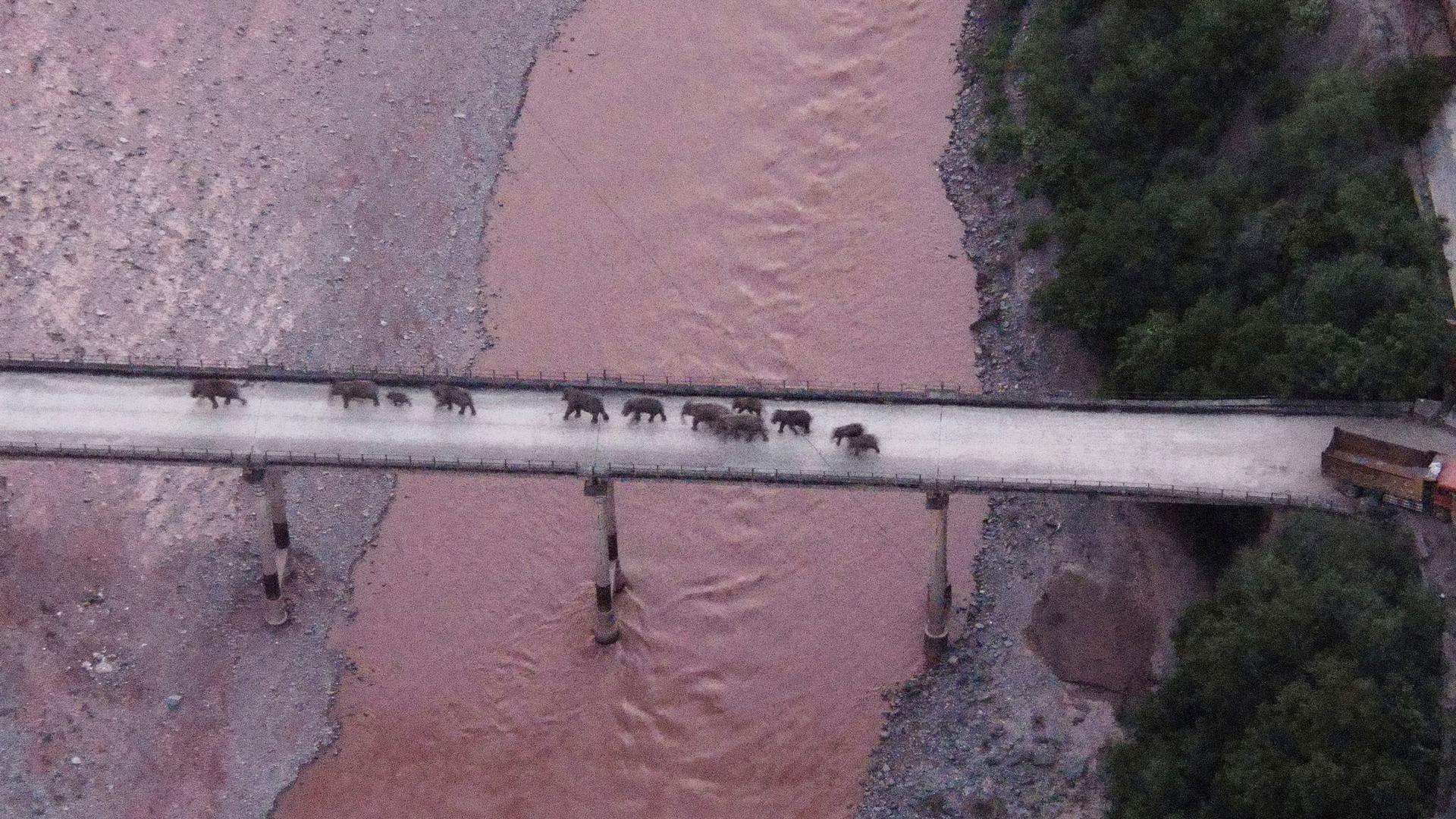Efforts underway to create and expand new habitats for China’s wandering elephants
Earlier this year, the world was captivated by the herd of 14 elephants, who took a 17-month, 800-mile journey from their home in western China to Kunming, the capital of Yunnan Province.
It made for some pretty wild reality TV, and millions of people tuned in to keep track of the herd’s daily movements. It took 25,000 police officers using drones and vehicles to lure them safely back to their wildlife reserve.
Now, efforts are underway to create more harmonious solutions to promote coexistence between humans and elephants, including a national elephant park and “canteens” for elephants to munch on their favorite grasses on protected lands during treks.
Related: Canada’s coastal wolves help promote ocean conservation
Becky Shu Chen, who grew up in Kunming, a city of 8 million people, said she was shocked when she learned that the herd of elephants was headed for her hometown.
“This never happens in human history, that elephants traveled so far away. So, the first question I asked myself is, like all the other people asking, why the elephants went so far?”
“This never happens in human history, that elephants traveled so far away. So, the first question I asked myself is, like all the other people asking, why the elephants went so far,” she said.
Chen works with the Zoological Society of London, so she knew elephants were naturally roaming animals — but this was an extreme case.
Decades ago in China, elephants were rarely seen near cities or towns. But since receiving legal protection in the 1990s, the number of wild elephants in Yunnan Province has nearly doubled to about 300 animals. That increase brings problems as humans and elephants live closer together. Encounters can be destructive or even deadly.
Related: Green China: Where authoritarianism and environmentalism meet
“Everyone loves elephants, right? But If I’m a farmer, I’m also frustrated if I have elephants in my backyard and eating up everything,” Chen said.

Elephants have been pushed out of their natural habitat by encroaching farmland, deforestation and development. Climate change is also a factor. Last year was an especially dry one in the part of Yunnan the elephants call home. All that has made it harder for elephants to find the food they need in nature. With no fear of human threat, they’ve gotten a taste for their food.
“Bananas, sugar canes, rice, it’s just like a sweet shop at their doorstep,” she said. “Once they learn they have free food here, why are they going back to eat that bland food, those grasses?”
The wandering elephants were something of a craze in China and led to calls from conservation groups for strengthened wildlife protection laws. They asked specifically for the government to establish an elephant national park in Yunnan to connect several wildlife reserves, so the animals can travel between them without encountering humans.
“We want to help them to find new habitat and to expand their habitat, as well as allow them to live alongside humans, so that both elephants and humans can benefit.”
“We want to help them to find new habitat and to expand their habitat, as well as allow them to live alongside humans, so that both elephants and humans can benefit,” said Zhou Jinfeng, director of the China Biodiversity Conservation and Green Development Foundation.
Related: Survey finds giant pandas no longer ‘endangered’ in China
Chinese news reports also highlighted a new elephant canteen being created in Yunnan Province. They’re large areas of protected land planted with elephant favorites like tiger grass and banana plants.
“We expect the elephants to come by and graze here probably only once or twice a year. … There’s enough for them to eat for a few days and then they’ll move on.”
Zhang Xiyan, a conservationist working on an elephant canteen project, said he hopes those plants will tempt the elephants to stay in the protected area and away from humans. “We expect the elephants to come by and graze here probably only once or twice a year,” he said. “There’s enough for them to eat for a few days and then they’ll move on.”
In the Baduo village in southern Yunnan Province, villagers walked in an elephant canteen in the lush mountainous area a few miles from their farmland. They broke ground to plant seedlings in soil.
Bu Ludu is a villager working on the effort.
“There used to be a lot of wildlife here … but after we cut down much of the forest and planted rubber and tea, there’ve been fewer animals. We hope through our reforestation work the wildlife will return.”
“There used to be a lot of wildlife here,” she said, “but after we cut down much of the forest and planted rubber and tea, there’ve been fewer animals. We hope through our reforestation work the wildlife will return.”
Related: Kenya conducts a national census for wildlife
Other efforts are underway, including a monitoring system that uses drones to track elephant movements. Local forest rangers send out alerts on social media when elephants are nearby, so people can avoid them.
And yes — apparently there’s an app for that, too. An automated message will tell you if there are elephants nearby or not, based on crowdsourced photos or videos from other users.
But larger efforts are in the works as well. On Tuesday, at a United Nations Biodiversity conference in Kunming, China’s President Xi Jinping pledged $232 million for a new biodiversity fund. And conservation groups are looking forward to the news of a proposed biodiversity law before the year’s end.
